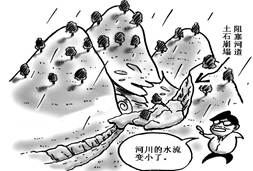阅读短文,并完成后面的任务。
Waste can be seen everywhere in the school. Some students ask for more food than they
can eat and others often forget to turn off the lights when they leave the classroom. They say
they can afford these things. But I don't agree with them.
Waste can bring a lot of problems. Although China is rich in some resources (资源), we
are short of others, for example; fresh water. It is reported that we will have no coal or oil to
use in 100 years. So if we go on wasting our resources, what can we use in the future and
where can we move? Think about it. 3. I think we should say no to the students who waste
things every day. Everybody should stop wasting as soon as possible.
In our everyday life, we can do many things to prevent (阻止) waste from happening,
for example, turn off the water taps when we finish washing, turn off the lights when we
leave the classroom, try not to order more food than we need, and so on. Little by little, everything
will be changed. 4. Waste can be stopped one day, if we do our best.
1. List the wastes mentioned in the first passage. (within 15 words)
____________________________________________________
2. What problems can waste bring? (within 20 words)
(1) _________________________________________________
(2) _________________________________________________
3. 将短文中画线的句子翻译成汉语。
____________________________________________________
4. ____________________________________________________
5. 请给短文拟一个适当的标题。(within 5words)
_____________________________________________________
1. Ask for more food and forget to turn off the lights.
2. (1) We'll be short of resources (fresh water, coal or oil).
(2)'We'll have nothing to use and nowhere to move. /What can we use in the
future and where can we move?
3. 我认为我们应该对那些天天浪费东西的学生说不。
4. 如果我们都尽力的话,将来有一天浪费就不会发生了。
5. Stop Wasting/No More Wasting
(3、4、5答案不唯一)

